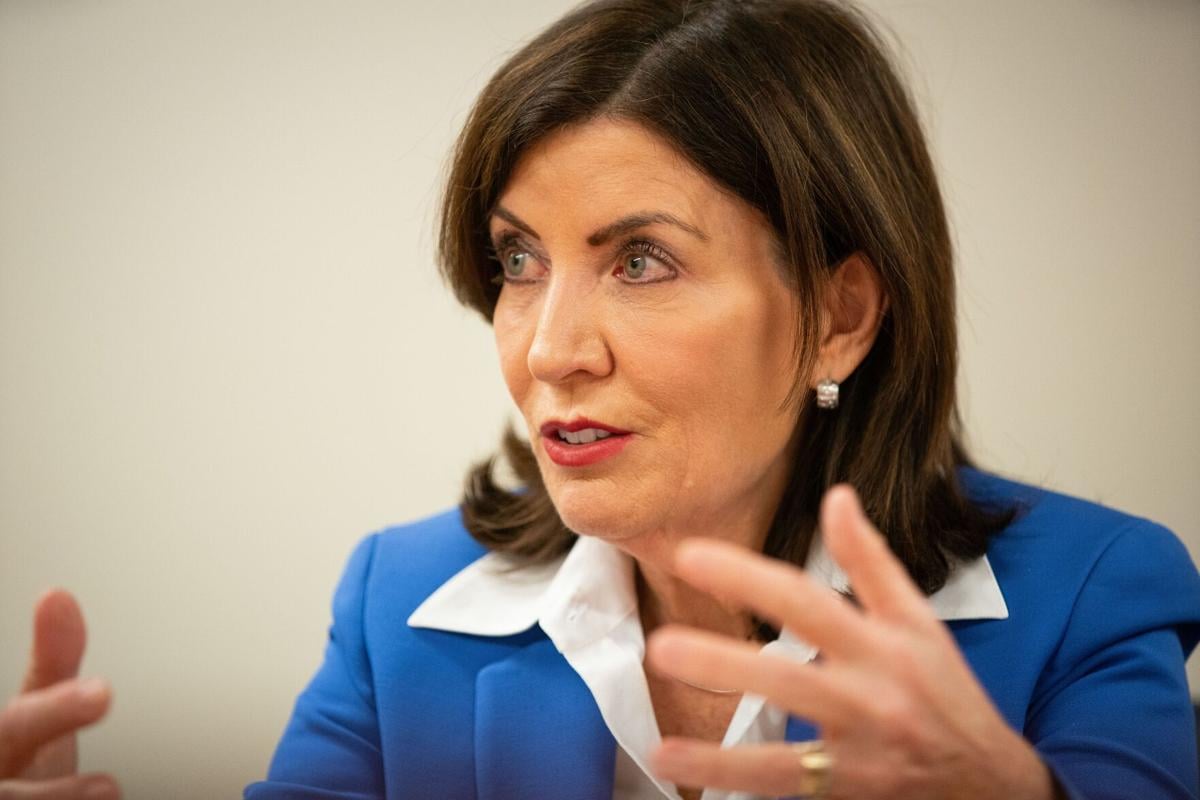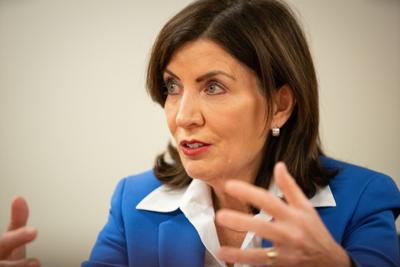Gov. Kathy Hochul has made no secret of her unhappiness with New York State’s rollout of the legalization of cannabis.
And that unhappiness is growing.
“It’s a disaster,” the governor told The Buffalo News editorial board last week. “I will not defend that for one second.”
Hochul, who inherited New York’s marijuana legalization act when she became governor in August 2021, has no issue with the policy itself. “I’m glad we stopped the mass incarceration of young people for consumption,” she said. “It’s the right policy.”
But nearly three years after the law was passed and signed in March 2021, she said she has deep concerns about the implementation.
In a lengthy and detailed response to a question from The News’ editorial board, Hochul – who typically maintains an even tone when discussing policy – slapped her hand on the table when calling the rollout a “disaster,” and added, “You have to go back to the very beginning. Prior to my time (as governor), the legislation was crafted in a way that was not poised for success.”
People are also reading…
- Bills safety Cole Bishop feels comfortable as he makes jump to Year 2. The defense needs him
- Inside the NHL: Jarmo Kekalainen is here to win, not just automatically replace Kevyn Adams
- Elizabeth Licata: Cool cars of summer and the women who love them
- Alan Pergament: Tom Bauerle taking WBEN show to Florida; WHLD gets patriotic new call letters
A law with no ‘teeth’
New York’s Marijuana Regulation and Taxation Act legalized the use of marijuana for adults ages 21 and up, and also led to the removal or expunging of nearly 400,000 cannabis-related arrests and convictions. Although research has shown that white people use cannabis as much or more than people of color, the vast majority of arrests were of Black and brown people.
“This legislation was important to do from an equitable perspective,” Assembly Majority Crystal Peoples-Stokes said in a conversation last September with The News’ editorial board. Peoples-Stokes, who like Hochul is a Buffalo Democrat, sponsored the legislation.
“It didn’t start with an equity intent,” Peoples-Stokes said. “It wasn’t intended to be equitable; it was intended to provide an opportunity for a new market in America to come from below ground to above ground.”
The way in which the legislation structures and regulates the emergence of that new market is where Hochul has a problem. While the law quickly made the use of cannabis legal, it also made the process of being able to sell it legally in New York one that is slow and difficult.
Hochul had expected about 400 retail and grower licenses to be reviewed by last week, but the Office of Cannabis Management Cannabis Control Board had been prepared to approve just three new retail locations.
That has led to unlicensed sellers freely and openly peddling pot, without paying taxes to the state and with little fear of consequences.
In her conversation with The News, Hochul described her concerns:
- A law without “teeth.” Hochul, who lived in Buffalo until taking over for former Gov. Andrew Cuomo in August 2021, spends much of her time in New York City. Which means she spends much of her time seeing weed being sold illegally.
“It’s not (on) every street corner,” she said of unauthorized marijuana sales in New York City. “It is every other storefront. It is insane.”
Hochul wants the State Legislature to empower local police to stop the sale of unlicensed, untaxed cannabis.
“I think it should be treated the way tobacco is: local law enforcement can stop illegal sale of cigarettes that are not licensed and taxed,” she said, noting that she advocated for stricter laws last year but had little success. “They don’t want to have the teeth in the law to stop the illegals.”
- Structural slowdowns. Hochul pointed to what she considers to be framework issues in the law, which was passed by the Legislature and signed by Cuomo in spring 2021, as slowing the rollout. “I’m frustrated,” Hochul said, pointing to an operational structure that includes having a paid executive director of the Office of Cannabis Management, and also a paid chair of the Cannabis Control Board. “So, inherently, conflict was built in as to who’s the ultimate decider. That didn’t go well.”
Hochul also called it a “bad idea” to have the Dormitory Authority of the State of New York, which typically focuses on construction and financing, in charge of finding locations for smaller retail shops. “That was not their forte,” she said. “Bad idea. So that took a long time.”
Starting over ‘not likely’
The governor also addressed a significant legal slowdown that lifted only recently: The law gave prioritized opportunity to open dispensaries to people who have been convicted of weed-related offenses, and to their close relatives. That provoked lawsuits from large medical marijuana companies and from veterans, and last summer, a judge put a halt to the issuing of any new licenses.
Those lawsuits were settled and the injunction lifted in late 2023, opening the way for more than 400 license-holders statewide to open their shops. But during those months of court-imposed limbo, Hochul said, “We’ve got farmers who are just losing money. We’ve got these people who took out loans and are excited about their opportunities, ready to start. And meanwhile, no money is flowing back to the state. We have all this, and the illicit market is flourishing.”
Hochul acknowledged that the opportunity to make the fixes she’d like to see is limited.
“There’s a strong part of me that would just like to go in and just start over,” she said. “But I’d have to go back to the Legislature and convince them to change the laws in every way I’ve described. It’s probably not likely to happen.”
Instead, Hochul is going to ask the Legislature to stiffen the deterrents to selling without a license.
“There should be strict penalties and fines, and there aren’t,” she said. “The Legislature needs to increase the penalties, and I’ve tried. I’ll try again.”























